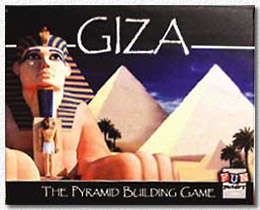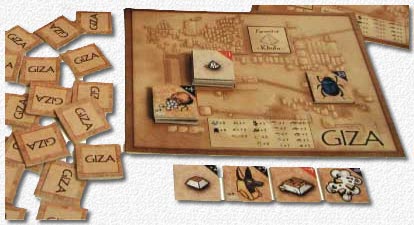
| Designer | Nikki Lim |
| Publisher | Fun Factory Games |
| released | 2005 |
| Players | 2-6 |
| Playing Time | 30 minutes |
 |
||||||||||
|
||||||||||
reviewed by Moritz Eggert
Asia in general has had a huge boardgaming boom in recent years - somehow gaming goes well with Asian mentality, and anybody who has ever seen a huge Mah-jongg gaming hall with hundreds of people intensely playing will understand that Asians are as avid players as anybody on this planet, perhaps even more so. It is therefore not surprising that there are also more and more high quality games from Asia.
Fun Factory, a new company from Singapore, has already produced one other big game, "Dividends" (which we reviewed on this site as well), "Giza" is their "small" game, catering more for the "family game" market instead of the "gamer geek" market. As "Dividends" this is a high production quality game, with a small box packed to the rim with tiles, boards, a very good rulebook with illustrations and a nice bag to draw tiles from.
"Giza" has players try to build pyramids. Each player has three building "sites" on his/her tile board, and a fourth building site for building a sphinx. Players take turns drawing building tiles that can be placed constructively on your own tile board or destructively on other players' tile boards. Pyramids, much like in "Tikal" (but there they are excavated), are built from the bottom up, but you can decide on which level you start a pyramid. "5" is the lowest level and "1" the highest. Each of these tiles comes in negative (e.g. "-5") and positive ("+5") versions. You can only place "higher" tiles on "lower" tiles, so you could place a 1, 2, 3 or 4 (negative or positive) on a 5 tile, but not a 5. The Sphinx consists of three defined tiles of which one is negative (the first one) and two are positive. Very lucrative are "treasure" tiles which can only be placed on the same level. Of course there are also some special tiles: The "demolition" tile destroys the uppermost tile of a stack, and the Scarab tile closes off a stack and can only be removed by basically sitting out a turn.

Once a pyramid is "topped off" with a 1 tile it is considered finished. The first player who finished his three pyramids ends the game; another ending condition is the exhaustion of the draw stock.
This is a VERY quick game. Even with the maximum number of six players one can expect to finish a game in 30 minutes maximum. The turn angst basically comes down to: "Do I play an evil tile on another player" or "do I further the construction of my own pyramids". Doing the former creates an enemy and might even be a kingmaking decision, doing the latter creates envy and lures other players into dumping bad tiles on you. The choices are limited each turn, as the selection of playable tiles is relatively small, sometimes you won't even be able to play a legal tile, which kind of takes the decision away from you.
If this sounds dull it does not necessary mean it is a dull game. The question is rather with WHOM you are going to play this game. The luck element is doubtlessly high, although the designer has gone to great lengths to create a stochastically solid selection of tiles that make some moves dumber than others when you think about probabilities and look at what tiles the other players have already used. With a round of "statisticians" this can actually lead to some pondering, much like the higher tiers of "Carcassonne" play also demand that you know the selection and probability of certain tiles appearing quite well to win against a seasoned opponent. But Giza is much lighter than Carcassonne, and the mathematical demands are not as high.
I personally enjoy it, while some seasoned gamers find it too light and random, especially when the kingmaking element of who attacks whom really kicks in. With families it becomes an ideal gateway game, though, which can be played with adults and youngsters alike, and also with non-gamers who find the usual Euro game fare "too heavy" for their tastes. If you like this game will therefore depend very much on the kind of groups you play in; it might be very successful in one group, and less in another.
It was a design decision to keep this game very short, actually the number of turns is rather low. If the game was longer and included a huger variation of tiles it would be more of a "gamer's" game, as then some building strategy would become more important than in the current incarnation of the game. But I don't see anything wrong with creating a quick game with simple rules and lots of interaction that can be played by virtually everybody, or is there?
| Characteristics | |
|---|---|
| Playing the game: | 30 minutes |
| Explaining the rules: | 5 minutes |
| Graphic design: | excellent |
| Production Values: | very high, nice looking solid tiles |
| Travel ability: | the game travels well, with a small and sturdy box |
| Egyptian Theme: | apparent |
| Interaction: | high, but sometimes you might be frustrated by the tiles available to you |
| Naughtiness factor: | high, some players might feel "picked on" |
| add/read comments |
©2006, Westpark Gamers